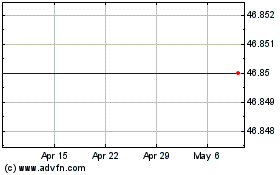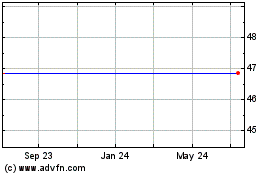Asian Shares Mixed as OPEC Doubts Offset Wall Street Strength
November 29 2016 - 11:20PM
Dow Jones News
Stock markets in Asia were mixed early Wednesday, as a positive
lead from Wall Street was offset by investor concerns that key
oil-producing nations won't be able to seal a deal to cut global
production.
Japan's Nikkei Stock Average was up 0.1%, snapping a two-day
decline, while Hong Kong's Hang Seng Index rose 0.3%, and Korea's
Kospi added 0.4%. By contrast, the Shanghai Composite Index was off
0.8% and Australia's S&P/ASX 200 fell 0.4%.
Energy stocks were the key decliners, after oil prices plunged
to a two-week low on Tuesday. There were mounting doubts that
members of the Organization of the Petroleum Exporting Countries
could reach a deal to cut output in the heavily oversupplied
market, when the oil cartel meets later on Wednesday.
"There is a diminished outlook for any agreement that can
surface from this OPEC meeting," said Woon Tian Yong, an investment
analyst at Phillip Futures, noting that the failure of an agreement
is being priced into energy stocks.
"The really big surprise is if there is an agreement from this
meeting, then we can expect to see the S&P 500 be lifted by
this," he said.
Stocks markets in oil-reliant economies took a hit. In addition
to Australia's weakness, the FTSE Bursa Malaysia Index was down
0.1%. Among individual stocks, Australia's Woodside Petroleum fell
2.5%, Japan Petroleum Exploration slid 1.5%, and PetroChina was off
0.6% in Hong Kong.
In Korea, shares of Samsung Electronics shares jumped 3.9% to
1,741,000 won ($1,491), a record intraday high, putting South
Korea's biggest and most influential stock on track for an all-time
closing high.
The move comes a day after the smartphone maker introduced a
bundle of shareholder-friendly measures, including increased
dividends and buybacks, changes to the board of directors and a
promise of changes to the structure of the broader Samsung
conglomerate.
While the measures fell short of what prominent Samsung
shareholder Elliott Management Corp. had asked for, the U.S.
activist hedge fund said in a statement that the measures were "a
constructive initial step."
Meanwhile, strength in other markets came as all three main U.S.
stock indexes ended in positive territory on Tuesday, with gains in
health-care stocks overriding declines in energy shares.
Additionally, solid growth and consumer confidence data
overnight fueled hopes for stronger U.S. economic expansion,
buoying investor confidence in Asian exporters.
On Tuesday, the U.S. Commerce Department reported a key measure
of after-tax earnings across U.S. corporations rose 5.2% in the
third quarter from a year earlier. The report also showed that
gross domestic product expanded at an inflation- and
seasonally-adjusted annual rate of 3.2% in the third quarter, its
strongest level in two years.
More broadly, the sharp outflows in emerging market equities and
bonds since the U.S. presidential election on expectations of
higher interest rates under President-elect Donald Trump have taken
a pause.
Client flows have recently slowed for some fund managers, though
the market is expecting further outflows, analysts say.
"Everybody is waiting for the big retracement that is not
coming," said Tareck Horchani, deputy head of Asian-Pacific sales
trading at Saxo Markets.
"With the rates higher, with the outflows in [emerging markets],
they're waiting for a bigger selloff in equities," he said.
Ben Leubsdorf, Jonathan Cheng and Kosaku Narioka contributed to
this article.
Write to Ese Erheriene at ese.erheriene@wsj.com
(END) Dow Jones Newswires
November 29, 2016 23:05 ET (04:05 GMT)
Copyright (c) 2016 Dow Jones & Company, Inc.
Petrochina (NYSE:PTR)
Historical Stock Chart
From Mar 2024 to Apr 2024

Petrochina (NYSE:PTR)
Historical Stock Chart
From Apr 2023 to Apr 2024
